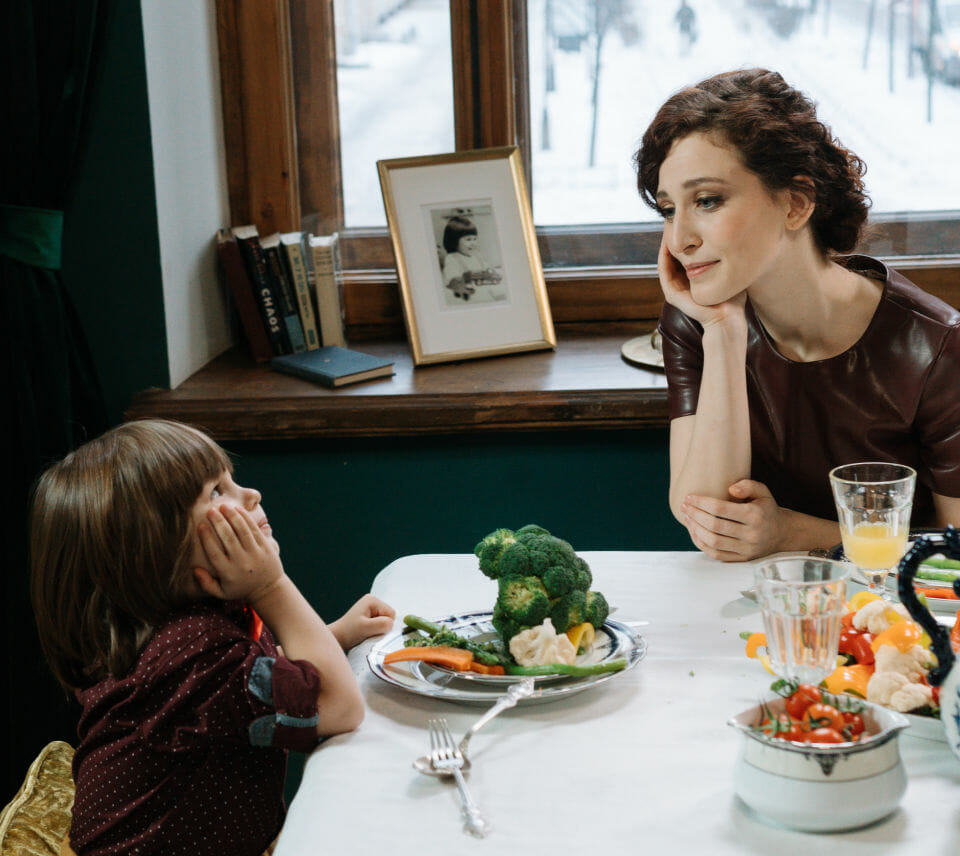![]()
How to reduce fear and stress at dinner time with fussy eaters

Trying to navigate and reduce fear and stress at dinner with a fussy eater is a minefield. We’re told every child gets fussy, and it’s just a phase, but when is enough, enough?
Ruth Fellowes is one of our wellness experts, a clinical nutritionist and an educator. She explains why your child can suddenly become fussy and what you can do about it.
You can hear more about this topic in her podcasts on the Healthy Mummy Wellness App.

It’s typical for a young child to rave about a particular food one day, you might serve it the next day, and then they won’t eat it or flick back and eat it again.
It’s how children learn about life and what works for them. But when a child completely loses interest in any kind of new food and has no curiosity. Or gets stuck in a rut of eating the same things repeatedly. That’s where parents need to intervene and reduce fear and stress at dinner with a fussy eater.
“I have come to many parents who say their kids are fussy and don’t like the texture of many foods,” she says.
“All of sudden, they might cut out an entire food group. For some kids, this is a little bit of a red flag or warning sign there is something underlying.”
“Sometimes you might need to get professional help. But before you do, there’s a lot you can do yourself.”
READ: Reducing stress at dinner
Stress and fussy eating

Stress can play a role in a child dropping their appetite and not being interested in new foods. As parents, we want to reduce fear and stress at dinner with a fussy eater.
“Kids can get stressed. One response is that they’ll stick to fave foods as they’re comfort foods,” says Ruth.
“It’s reassuring. It’s consistent. It’s regular. It’s also your child’s way to have that bit of control over their lives and a sense of security and safety.”
Comfort food makes us feel good. And stress could push your child to comfort themselves, and you’ll want to reduce fear and stress at dinner with a fussy eater. If stress is the driving reason a child limits foods, you’ll see this stress pop up in other ways. It might be in the way they interact with family and friends.
They might be a bit more withdrawn. Your child’s sleep might change. They might wake up at night or find falling asleep hard. You’ll see it in their emotions as well. They might be cranky and crying more.
“If your body is feeling stressed, your appetite will drop down. Your body is dedicating all its energy to facing what it’s facing,” says Ruth.
“You’re probably thinking, ‘what can my child be stressed about?’ But growing can be stressful. It could be as simple as someone speaking to them at school in a tone different from home.”
“If you can’t find the source of the stress, you need to interpret the signs. Support your child, give extra hugs and extra one-on-one time. They’re little people, they’re very immature, and they don’t have the strategies we have to deal with life yet.”
Having high expectations

Are we unintentionally stressing our child with our expectations and attitudes around food? We must review our food attitudes if we genuinely want to reduce fear and stress at dinner with a fussy eater.
“Check whether you are putting unconscious stress on a child. A good tip is to drop expectations around them eating the way you want to eat,” says Ruth.
“Rethink the pressure you might be putting on them. Nagging or saying ‘eat this’ is putting a lot of attention on what they eat and how much they eat.”
“Instead, take a teaching or training approach. Your child will not suddenly eat those green peas on the plate. Realise you are training them to eat well.”
“Exactly the same as you train them to go on the toilet. Your child could take weeks and months. It’s exactly the same with food. You are there to train, guide and coax them.”
We can be our own worst enemy when we have certain expectations. By putting in the work, you can reduce fear and stress at dinner with a fussy eater.
7 types of attitudes parents have about food that can affect our child
Working on how to reduce fear and stress at dinner with a fussy eater, you might benefit from better understanding the attitude you have about food. Ruth says there are 7 types of attitudes parents have about food that can affect our children…
The hunger avoider

Are you the one who says ‘have this instead’ if your child doesn’t eat their dinner? You probably have the food attitude of a hunger avoided.
You know they’ll eat this thing instead, so give in to your kid as you don’t want to be hungry.
You perceive that a child should never be hungry as you have a soft nurturing heart. But by using this approach, you’re letting these habits develop.
The peacemaker

Do you avoid drama or fights at the dinner table? Does seeing your child unhappy at the dinner table cause you stress? Then you may have the food attitude of the peacemaker as they don’t want any drama or fights around food. You’ll be the one to instigate the mission to reduce fear and stress at dinner with a fussy eater.
Your version of giving in is that you’ll make something different as you can’t handle the stress of them not wanting to eat what you originally made for them.
The nutritionist

Are you strict with what your child eats because you know what’s good for them? You may have a nutritionist food attitude. You’ll avoid giving your child anything artificial or sugary.
But ALL of us like treat food. It’s wired in our taste buds. We can make these amazing meals and super healthy muffins. Then the kids don’t like that and want that chocolate biscuit.
We may not realise we are pushing them away from healthy food and leaning more towards their favourite junk food. We don’t have to be so rigid in our approach. Defiance is a way of control.
The true nurture

Are you a bit more generous with the treat food and junk food with your kids? You likely have the true nurture food attitude and can use it to help reduce fear and stress at dinner with a fussy eater.
You may find giving the treats is more about it makes you happy to see them happy.
You have the idea that children should enjoy food and life like it’s a free pass to eat junk food daily.
What’s more, you can use this type of approach with all family members. The dads or the grandparents take on the nurturer role more often than not.
The comforter

Is your child quieter, more reserved or more anxious, and you don’t want them to feel bad? You will probably find that you have a comforter food attitude and want to offer a snack to cheer them up or buy an ice cream.
To help reduce fear and stress at dinner with a fussy eater, you need to take a step back and give them a hug first, a nap, or get them outside in the fresh air. Look for other non-food ways to pick your child up.
The time buyer

Do your kids take forever to get things done, so you offer them snacks or treats to encourage them to finish tasks? You probably have the time buyer food attitude. You may be on the phone, so you give your child a snack to keep them quiet.
The principled junk eater

Were you a fussy eater as a child and never really liked to eat your vegetables, so feel you can’t really expect it from your children? Then you have the principled junk eater food attitude that you need to work with to reduce fear and stress at dinner with a fussy eater. As a parent with this food attitude, you may have the most work to do to be an effective guide.
When cooking for our kids, we’ll often eat their leftovers. If you’re cooking for them and you know, it includes something you don’t like, so if they don’t eat it, then it’s a waste. You may change what you cook. We don’t have to serve huge amounts of these foods. It’s just exposure you’re giving to your child.
How do you stop yourself from falling into these different types of roles?

You can work on your attitudes to food to help reduce fear and stress at dinner with a fussy eater. Some families might have parents coming from different styles, giving their kids confusing messages. It can clash if one person tries to endorse healthier foods and the other is giving junk food. This can work against your goal to reduce fear and stress at dinner with a fussy eater.
“There are a couple of simple things you can do,” says Ruth.
“Watch what’s happening at the dinner table. Use your words carefully. Instead of focusing on what the child is eating at the dinner table, make sure the conversation is about anything but food.”
“It can be as simple as ‘what will we do after we’ve had lunch?’ Or talk about how the day was. You don’t need to be a conversationalist. Just not focus on what the child is doing in relation to food. You don’t want the child to feel like eating healthy food is stressful.”
Letting the child decide their portion size

Another strategy is to serve dinner where everything is in the middle of the table. Then each person decides how much goes on their plate. Leaving things open and allowing everyone to make their own serving decisions can help reduce fear and stress at dinner with a fussy eater.
“Many parents are giving too big of a portion, and it can feel overwhelming for kids,” says Ruth.
“Let your kids have some measure of control over their food. It’s not a magic fix, but it’s starting to teach them how to relax around food.”
“A really typical phrase is ‘just take a bite’, but this puts pressure on them.”
“You could use a supportive phrase, ‘it’s here for you when you’re ready.’ You’re sending the message that you’re expecting them to eat it but not forcing them to. It’s amazing how powerful our words are.”

Parents are also training themselves when they have a fussy eater. When you work to reduce fear and stress at dinner with a fussy eater, you also help yourself. Making positive changes will help improve dinner for all the family and overcome fussiness.
Reducing stress can go a long way to reducing fussiness.
The importance of exercise, nutrition and sleep for children with ADHD
How food affects a child’s behaviour and mood
Why mums need to be food label detectives
Get Access to the full Podcast in the Healthy Mummy Wellness App

The Healthy Mummy Wellness app is built to support mums’ mental, physical and social well-being.
We have expert advice to help mums makeover their minds, transform their mood, manage their hormones, sleep better and engage with their family.
You can listen to podcasts, read blogs, work out with our trainers and find healthy, family-friendly recipes from the palm of your hand.



